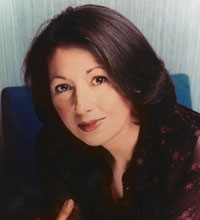|
|
Two Worlds, Una Familia
Marie Arana (WCAS71) wrote a memoir about her Peruvian American family
that has received critical acclaim.
 |
|
|
An ancestor’s name uncovered. A link to her family’s buried
past.
Images lead to memories, memories lead to stories, and nearly four years
later, these revelations led to Marie Arana’s first published book
— a memoir that placed the respected book critic and literary editor
in the shoes of an author.
Arana (WCAS71), editor of the Washington Post’s Book World,
the weekly literary supplement, acknowledges she made a "huge leap"
when she began the actual process of writing a book.
Her memoir, American Chica: Two Worlds, One Childhood (Dial Press,
2001), which was a finalist for a National Book Award last year, is about
growing up as the daughter of a North American mother and Peruvian father.
It was during a media fellowship at Stanford University in 1997 that the
memories of her childhood were reignited. In the Stanford library she
happened upon the name of an ancestor, Julio Cesar Arana — an infamous
Peruvian rubber baron who, in the early 1900s, created a hell on earth
for thousands of virtually enslaved rain-forest Indians toiling on 25
million acres of land in the Amazon region.
Arana could not stop the flood of memories and images elicited by her
ancestor’s name. "It was the most hallucinatory recollection
of images," she says.
"I decided I really needed to go back [to Peru]."
As dreadful and upsetting as the discovery of Julio Cesar Arana’s
history was, the contemporary Arana decided to devote most of her book
to a more directly personal issue: her bicultural inheritance from her
mother and father. "A South American man, a North American woman
— hoping against hope, throwing a frail span over the divide, trying
to bolt beams into sand," Arana wrote. "There is a fundamental
rift between North and South America, a flaw so deep it is tectonic."
It was precisely this rift that compelled Arana to bury the remnants of
her Latina self when she moved to New Jersey with her family at age 10.
At Northwestern Arana kept herself busy as a member of Delta Gamma sorority,
captain of the pom pom squad and homecoming queen. Under the guidance
of Slavic studies professor Irwin Weil, she developed a fascination for
Russian literature and culture that took her to St. Petersburg for a junior
year abroad.
Arana moved in 1979 to New York City to go into book publishing. Eventually
she was offered a position as deputy book editor at the Post while commuting
between New York, where she worked for publisher Simon & Schuster,
and Washington, D.C. She went full time with the paper in 1992.
Arana has served on the board of directors of the National Association
of Hispanic Journalists and the National Book Critics Circle. "Working
with other Hispanic journalists to improve coverage of Hispanic issues
has been a very important goal for me," she says. "And working
with other book critics to keep the culture of reading alive has been
rewarding as well."
Now that she has contributed her own work to this "culture,"
Arana is pleased at the critics’ overwhelmingly positive responses
to her memoir and has begun work on her next project — a novel set
in Peru.
Fiction or nonfiction, Arana’s writing carries the reality of love’s
struggles.
"The important message is the theme of people loving one another
across great divides," she says. "That’s really the payoff."
— Negar Tekeei (J03)
RETURN TO TOP
|

